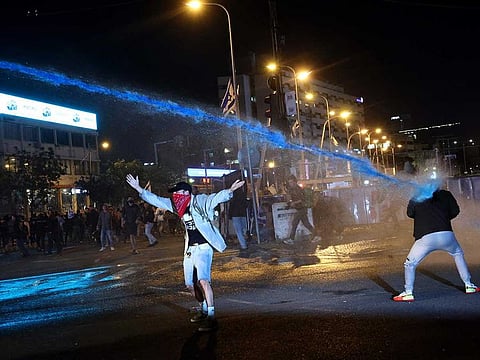‘Democracy in danger’: Timeline of Israel protests
A look back at key moments in the months of turmoil in Israel

Paris: Months of turmoil in Israel over controversial judicial reforms that have sparked massive anti-government protests deepened on Monday as unions declared a strike and flights were suspended.
As embattled Prime Minister Benjamin Netanyahu prepares to address the nation about the crisis, a look back at key moments.
Jan. 4: Reforms unveiled
Israel’s Justice Minister Yariv Levin unveils plans to reform the judicial system which would give politicians more power over the courts.
The proposed measures include giving parliament the power to overrule some Supreme Court decisions, and the government a greater say in the appointment of judges.
Levin claims the court’s power to strike down legislation is a “danger” to democracy.
Critics accuse Netanyahu, who is on trial on corruption charge he denies, of trying to use the reforms to quash possible judgements against him.
Opposition leader Yair Lapid says the proposal “endangers the entire legal system of the State of Israel”.
Jan. 7: First mass protests
Thousands of people in Tel Aviv demonstrate against the reforms and other policies of Netanyahu’s administration, one of the most right-wing governments in Israeli history.
Some protesters carry placards warning: “Democracy in danger”.
Jan. 12: Top judge speaks out
Supreme Court president Esther Hayut in rare public remarks calls the reform package “an unbridled attack on the legal system, as if it were an enemy”.
Jan. 21: Demonstrations spread
By the third week of Saturday protests, the numbers of demonstrators grow to the tens of thousands and spread from Tel Aviv to other cities, including Haifa and Jerusalem.
Jan. 24: Tech workers join in
Hundreds of Israeli high-tech workers join the protests, claiming the government’s controversial plans will hurt the flourishing sector - a cornerstone of Israel’s economy - by undermining the rule of law and pushing away investors.
Feb. 12: President’s appeal
President Isaac Herzog, who has a largely ceremonial role, warns Israel is “on the verge of legal and social collapse” and urges Netanyahu not to introduce the reforms.
Feb. 21: UN urges rethink
Volker Turk, the United Nations human rights chief, urges Israel to pause the reforms, saying he is concerned that “if passed, these changes risk weakening human rights protections for all.”
Netanyahu denounces the appeal as an “absurdity”.
Mar. 1: Police crackdown
Police in Tel Aviv use stun grenades, water cannon and officers on horseback to disperse protesters who attempt to block roads and railways in what organisers call a “day of disruption”.
Netanyahu accuses the demonstrators of crossing “a red line” and says he would not “tolerate anarchy”.
Mar. 6: Fighter pilots protest
Thirty-seven Israeli air force pilots announce boycott of military training in protest at the reforms.
Mar. 15: German ‘concern’
German Chancellor Olaf Scholz expresses “great concern” over the reforms during a visit by Netanyahu to Berlin, calling on the Israeli government to compromise.
Mar. 19: Biden call
US President Joe Biden in a call with Netanyahu also urges “compromise”.
He tells the Israeli leader that the judicial reforms must respect the democratic values that Biden calls a “hallmark” of the US-Israeli relationship.
Mar. 25: Minister breaks ranks
Israel’s Defence Minister Yoav Gallant breaks ranks with Netanyahu by calling to halt legislation.
He cites “a clear, immediate and tangible threat to Israel’s security” as the unrest spreads to security agencies.
An estimated 200,000 people demonstrate in Tel Aviv.
Mar. 26: Minister fired
Back from a visit to London, Netanyahu fires Gallant.
The United States says it is “deeply concerned” about the developments in Israel.
Mar. 27: General strike
Israel’s top trade union leader Arnon Bar-David declares a general strike.
President Herzog calls for the reform to be halted “immediately”.
Justice Minister Levin says he will “accept any decision that Prime Minister Netanyahu makes”.



